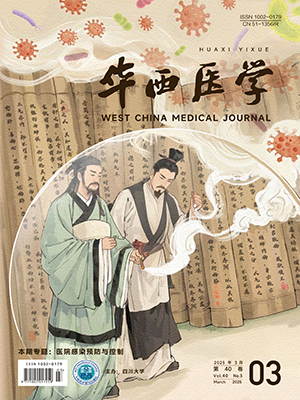| 1. |
陈玉国, 徐峰. 中国心脏骤停与心肺复苏报告(2022 年版). 北京: 人民卫生出版社, 2023: 16-21.
|
| 2. |
Meyer MAS, Bjerre M, Wiberg S, et al. Modulation of inflammation by treatment with tocilizumab after out-of-hospital cardiac arrest and associations with clinical status, myocardial- and brain injury. Resuscitation, 2023, 184: 109676.
|
| 3. |
Fehler P, Zielińska M, Uchmanowicz B, et al. Do body mass index and nutritional risk score 2002 influence the in-hospital mortality of patients following cardiac arrest?. Nutrients, 2023, 15(2): 436.
|
| 4. |
Matsuda J, Kato S, Yano H, et al. The Sequential Organ Failure Assessment (SOFA) score predicts mortality and neurological outcome in patients with post-cardiac arrest syndrome. J Cardiol, 2020, 76(3): 295-302.
|
| 5. |
Wang Z, Zhao L, He S. Prognostic nutritional index and the risk of mortality in patients with hypertrophic cardiomyopathy. Int J Cardiol, 2021, 331: 152-157.
|
| 6. |
孔钦, 叶长青, 孙赟. 大数据下数据预处理方法研究. 计算机技术与发展, 2018, 28(5): 1-4.
|
| 7. |
Huang Y, Zhang Q, Li P, et al. The prognostic nutritional index predicts all-cause mortality in critically ill patients with acute myocardial infarction. BMC Cardiovasc Disord, 2023, 23(1): 339.
|
| 8. |
Ryzhov S, May T, Dziodzio J, et al. Number of circulating CD 73-expressing lymphocytes correlates with survival after cardiac arrest. J Am Heart Assoc, 2019, 8(13): e010874.
|
| 9. |
Cour M, Jahandiez V, Bochaton T, et al. Cyclosporine A prevents ischemia-reperfusion-induced lymphopenia after out-of-hospital cardiac arrest: a predefined sub-study of the CYRUS trial. Resuscitation, 2019, 138: 129-131.
|
| 10. |
Wang W, Li R, Miao W, et al. Development and evaluation of a novel mouse model of asphyxial cardiac arrest revealed severely impaired lymphopoiesis after resuscitation. J Am Heart Assoc, 2021, 10(11): e019142.
|
| 11. |
Kong T, Chung SP, Lee HS, et al. The prognostic usefulness of the lactate/albumin ratio for predicting clinical outcomes in out-of-hospital cardiac arrest: a prospective, multicenter observational study (koCARC) study. Shock, 2020, 53(4): 442-451.
|
| 12. |
Yoon JH, Choi WS, Lim YS, et al. Comparison of prognostic performance between procalcitonin and procalcitonin-to-albumin ratio in post cardiac arrest syndrome. J Clin Med, 2023, 12(14): 4568.
|
| 13. |
Hong SI, Kim YJ, Cho YJ, et al. Predictive value of pre-arrest albumin level with GO-FAR score in patients with in-hospital cardiac arrest. Sci Rep, 2021, 11(1): 10631.
|
| 14. |
Lee H, Lee J, Shin H, et al. Association between early phase serum albumin levels and outcomes of post-cardiac arrest patients: a systematic review and meta-analysis. J Pers Med, 2022, 12(11): 1787.
|
| 15. |
Matsuyama T, Iwami T, Yamada T, et al. Effect of serum albumin concentration on neurological outcome after out-of-hospital cardiac arrest (from the CRITICAL [Comprehensive Registry of Intensive Cares for OHCA Survival] Study in Osaka, Japan). Am J Cardiol, 2018, 121(2): 156-161.
|
| 16. |
Kalyoncuoğlu M, Katkat F, Biter HI, et al. Predicting one-year deaths and major adverse vascular events with the controlling nutritional status score in elderly patients with non-ST-elevated myocardial infarction undergoing percutaneous coronary intervention. J Clin Med, 2021, 10(11): 2247.
|
| 17. |
Raposeiras Roubín S, Abu Assi E, Cespón Fernandez M, et al. Prevalence and prognostic significance of malnutrition in patients with acute coronary syndrome. J Am Coll Cardiol, 2020, 76(7): 828-840.
|
| 18. |
Ferreira FL, Bota DP, Bross A, et al. Serial evaluation of the SOFA score to predict outcome in critically ill patients. JAMA, 2001, 286(14): 1754-1758.
|
| 19. |
Cour M, Bresson D, Hernu R, et al. SOFA score to assess the severity of the post-cardiac arrest syndrome. Resuscitation, 2016, 102: 110-115.
|
| 20. |
Pekkarinen PT, Bäcklund M, Efendijev I, et al. Association of extracerebral organ failure with 1-year survival and healthcare-associated costs after cardiac arrest: an observational database study. Crit Care, 2019, 23(1): 67.
|
| 21. |
Vaahersalo J, Skrifvars MB, Pulkki K, et al. Admission interleukin-6 is associated with post resuscitation organ dysfunction and predicts long-term neurological outcome after out-of-hospital ventricular fibrillation. Resuscitation, 2014, 85(11): 1573-1579.
|




